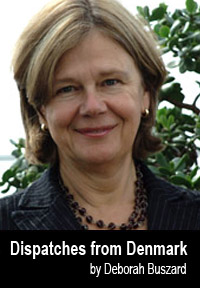 |
December 14Â
Copenhagen
Yesterday, Claire Campbell wrote of our experiences at Bright Green, one of the numerous side events at this enormous gathering. Today she is in Aarhous and Iâm with the Nova Scotia delegation in Copenhagen, where the COP 15 formal negotiations began again after a rest day yesterday. Itâs a fascinating place to be even when, as today, things donât quite go according to plan.
The Danish presidency of COP 15 was roundly attacked at todayâs negotiations by the G77-China block (which includes 130 less developed nations) for favoring the interests of the developed nations and the G77-China group then walked outâhalting formal negotiations. Apparently informal discussions continue this afternoon, but the mood is gloomy.
Itâs amazing how many people are here, representing everything from nations to boy scouts and energy companies. Everyone wants a say and everyone is here. Today I was in line waiting to be admitted to the hall for more than four hours. I was lined up with the delegation from Taipei, Taiwan, including Governor Hsei-Wei Chou, a French âactivistâ and a representative of the World Wind Energy Association. We had a lot of time to talk and of course for them to learn about HÂş» and the College of Sustainability. There is a lot of interest in the College and our new program and I learned a lot about Taipei and their adaptation strategies including electric buses.
Unfortunately the COP 15 meeting itself is a worrying example of disorganization: the convention centre where the talks are taking place only holds 15,000 people but the UN apparently accepted nominations of more than 45,000 as delegates and observers! Over the weekend the organizers introduced a quota system, allowing only a few of the members of each group in to COP 15 on any one day. One has to wonder if the organizers can get an invitation list this wrong, how well can they hope to manage something really important like getting global agreement on reducing GHG emissions?Â
Probably the best part of being here is hearing the voices of so many concerned citizens, from so many nations, all saying that we must change how we live on this planet. As one poster says: âThere is no planet B.âÂ
The city is alive with events, exhibitions and occasional protests and demonstrations, if only the talks could get back on track.
Deborah Buszard is the Associate Director, Research and Outreach, with HÂş»'s College of Sustainability.
